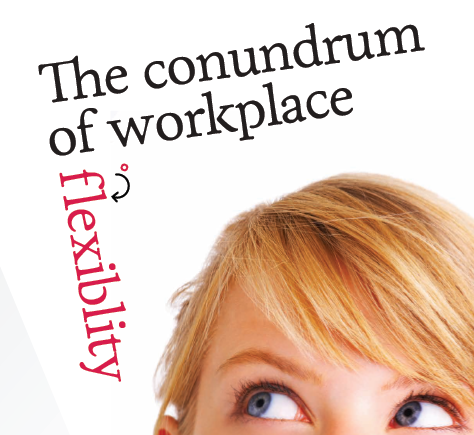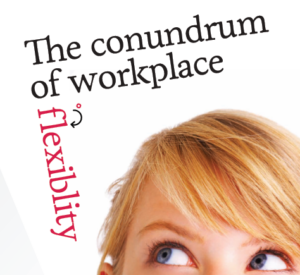
Symmetra’s latest research on bias and workplace flexibility has been featured in the Australian Financial Review. Coming soon, Symmetra’s WhitePaper on the conundrum of flexibility identifies some of the most persistent biases of those who work flexibly. Below is the article from the AFR.
Six reasons why flexible work spells career death
Why do leaders scorn people who want to work flexibly when they, as the bosses, freely make choices about the hours and location of their own work?
The answer comes down to branding. When employees ask for flexible arrangements, their managers think they lack dedication and are less valuable to the organisation.
However, when senior executives work outside of traditional business hours or in a different location, that is regarded as a “management prerogative” and is rarely thought of as “flexible working”, says diversity consultant, Heather Price, chief executive of Symmetra.
Recent research in the UK shows 77 per cent of chief executives and 54 per cent of senior managers do not maintain standard 9 to 5 work schedules, but this is generally an informal arrangement.
While leaders would argue their schedules reflect the greater demands on their time, the fact remains that they would probably also believe they are working effectively while away from the office or out of standard business hours.
Employers take a pretty dim view of flexibility – although it is often a product of unconscious bias.
When Symmetra polled 473 executives about 14 leadership behaviours exhibited by their employees, all but one were skewed towards the full-timers. The exception was their ability to manage work-life balance.
You might think that female leaders have a more enlightened view of the workplace and are less likely to discriminate against the careers of those who want to vary their hours or location. But you would be wrong.
Price’s research on 473 senior executives across Australia, New Zealand, the US and Hong Kong shows that it is managers that are the problem – not just male managers.
“[The women] have taken on those cultural values and assumptions,” says Price.
Although managers and leaders may espouse the values of their flexible work policies, they have not been able to shake themselves free of the myths about what makes a good, effective and dedicated employee.
Through her research, released exclusively to The Australian Financial Review, Price has identified six of the most persistent biases:
1. Full-time workers are more assertive and self-promoting.
Price says there appears to be no scientific data to support this myth about what are, fundamentally, personal traits rather than workplace behaviours.
“It reflects the implicit assumption that flexible workers are predominantly female and exhibit female characteristics whereas full-time workers, in contrast, are predominantly male and exhibit masculine characteristics”.
When it comes to being assertive, women find themselves in a bind: “If they maintain a degree of modesty about their achievements, they are perceived to be too self-effacing and not worthy of promotion, but if they imitate male forthrightness, they are seen to be unduly aggressive”.
No matter if you are male or female, if you adopt an apparent female profile by deviating from the “company man” norm, you will be consigned to the margins.
2. Flexible workers are less ambitious.
“There is no rational basis for the proposition that ambition equates to the number of hours worked or the location where the work occurs,” says Price.
“Many extremely ambitious men and women operate as independent consultants or are self-employed in order to enjoy the benefits of career advancement and accumulation of capital whilst having control over their own working lives.”
Recent research by Catalyst shows flexible workers aspire to the most senior positions – including CEO roles. In fact, they are more likely to do so if their organisation offers flexibility.
“However, many employees in these flexible-work situations [most likely women] feel they are not adequately challenged or supported to pursue their ambitions. Equally, a significant number of these part-time employees report high levels of job satisfaction and a low desire to change their hours to full-time, which may be misinterpreted by some as less ambition.”
3. Flexible workers do not help in developing others.
There is an erroneous belief that flexible workers are less committed to their organisations and, as a consequence, are less inclined to devote time to others employed in the organisation, says Price.
“It also rests on the out-dated notion that mentoring can only be effective when the parties are physically at the same place.”
Price says research shows flexible workers are more committed to their organisation because their freedom is usually seen as an acknowledgement of the responsibility of the employee and the trust demonstrated by the employer.
“There is no evidence that flexible workers are any less prepared than full-time employees to mentor or assist co-employees.”
4. Clients react negatively if they are required to deal with employees who work flexibly.
This assumes customers and clients will continue to behave in the same way and hold the same expectations as they did in the past – even though everything in business around them is changing.
When clients are adopting flexible work policies themselves, they no longer expect their service provider to be sitting by the phone in their office, awaiting their call or email. In those “high-touch” sectors, people can be always available wherever they are, thanks to their mobile phones and tablets.
“Globalisation has made it inevitable that businesses and customers increasingly interact at a distance and at mutually convenient times,” says Price.
“In a survey in the UK, with customers buying consultancy services, 65 per cent of respondents rated experiences with flexible workers as positive.
“Clients are more likely to be impressed by the efficiency of service and the effectiveness of outcomes rather than the fact that their contact person is available five days a week.”
5. A commitment to full-time work is a strong indication of leadership qualities.
In large corporations, leaders are sourced almost exclusively from the ranks of full-time workers who have had uninterrupted careers.
“In many instances, leaders judge commitment by the extent to which an employee is prepared to devote time to the organisation and to move through a linear career path. Commitment, however, should be assessed by the extent to which an employee ensures that he or she enables the organisation to meet its obligations in a timely, efficient and excellent manner, irrespective of their flexibility status,” says Price.
6. Flexible workers are less credible.
When leaders think flexible workers are less than ideal employees, they are discriminated against in terms of pay, assignments, promotions, leave, mentoring and other opportunities .
”Employees working flexibly are simply not expected to be high-performers. Therefore, the normal performance distribution that would be expected for any group of employees actually becomes distorted. Although almost certainly there must be high performers amongst flexible workers, they are often missed,” says Price.
Because flexible workers are not regarded with the same degree of seriousness as their colleagues, little effort is made to equip their managers with the skills to implement successful flexible working.
A recent global survey found 83 per cent of managers received no training on the implementation of flexible working programs.
The Australian Financial Review
For more information on Symmetra’s Flexible work solutions, visit our FlexAgility page, call us on +61 (0) 2 8570 9400 or email flex@symmetra.com.au

